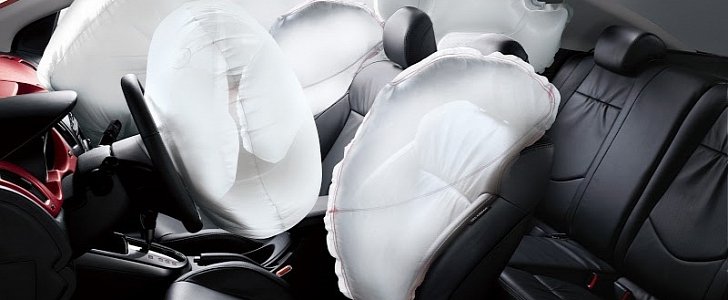There are two soap operas currently unravelling in the automotive world, and they both have devastating effects on the companies involved. The younger of the two is the Volkswagen emissions scandal, the so-called "Dieselgate" that has taken its toll on the German manufacturer's dreams of ruling the world.
The second dates a little further behind and involves Japanese airbag inflator maker Takata. Few people had heard the name before the scandal broke out, but Takata supplies its products to a lot of the industry's big names, including Honda, Toyota or Nissan, but also American or European brands.
Already the protagonist of the largest recall ever, Takata's woes could be far from over. Estimating the cost it would have to face should all of the cars equipped with its airbag inflators be recalled, the company came up with a truly scary sum: 2.7 trillion yen, which equals to $24 billion. In other words, more than Takata could ever afford.
This piece of news led to the most severe plunge for Takata's stocks, dropping by roughly 20 percent to 414 yen and bringing the company's market value down to $307 million. But Takata wasn't alone in this dip, dragging Japanese carmakers Honda (-3.6 percent), Nissan (-3.7 percent) and Toyota (-2.5 percent) along with it.
“Even if this is the worst-case simulation, it shows the company has seen some possibility,” Ken Miyao, an analyst with Tokyo-based market researcher Carnorama, told Bloomberg. “The question is how much the carmakers want to split the costs. But even if Takata only bears half of the cost, this would still be beyond their scope.”
Until now, there were nine fatalities in the US that have been attributed to faulty airbag inflators made by Takata, but their ubiquitousness makes other incidents a very likely possibility. The NHTSA has given the Japanese company until the end of 2019 to either prove the inflators are safe, or come up with an explanation for what's happened. An independent researcher concluded that it was moist leaking inside the inflators that caused the previous incidents, but Takata is yet to confirm these findings.
Already the protagonist of the largest recall ever, Takata's woes could be far from over. Estimating the cost it would have to face should all of the cars equipped with its airbag inflators be recalled, the company came up with a truly scary sum: 2.7 trillion yen, which equals to $24 billion. In other words, more than Takata could ever afford.
This piece of news led to the most severe plunge for Takata's stocks, dropping by roughly 20 percent to 414 yen and bringing the company's market value down to $307 million. But Takata wasn't alone in this dip, dragging Japanese carmakers Honda (-3.6 percent), Nissan (-3.7 percent) and Toyota (-2.5 percent) along with it.
“Even if this is the worst-case simulation, it shows the company has seen some possibility,” Ken Miyao, an analyst with Tokyo-based market researcher Carnorama, told Bloomberg. “The question is how much the carmakers want to split the costs. But even if Takata only bears half of the cost, this would still be beyond their scope.”
Until now, there were nine fatalities in the US that have been attributed to faulty airbag inflators made by Takata, but their ubiquitousness makes other incidents a very likely possibility. The NHTSA has given the Japanese company until the end of 2019 to either prove the inflators are safe, or come up with an explanation for what's happened. An independent researcher concluded that it was moist leaking inside the inflators that caused the previous incidents, but Takata is yet to confirm these findings.

